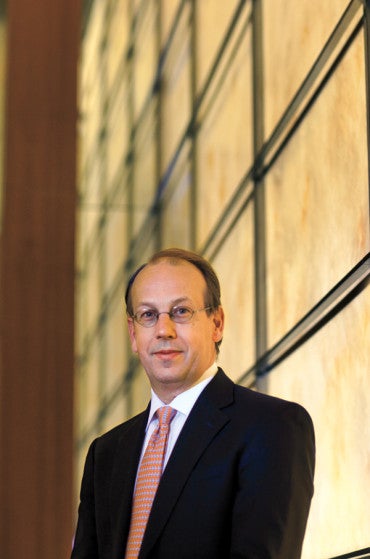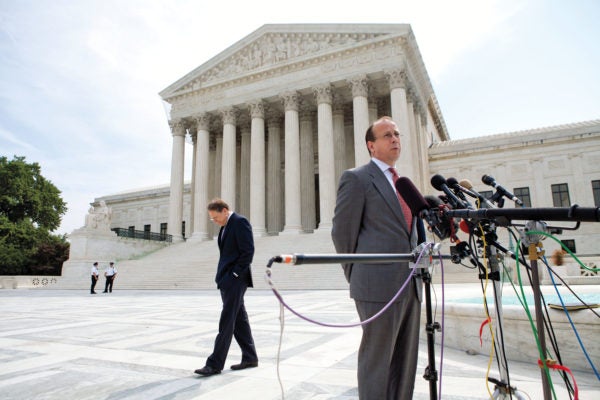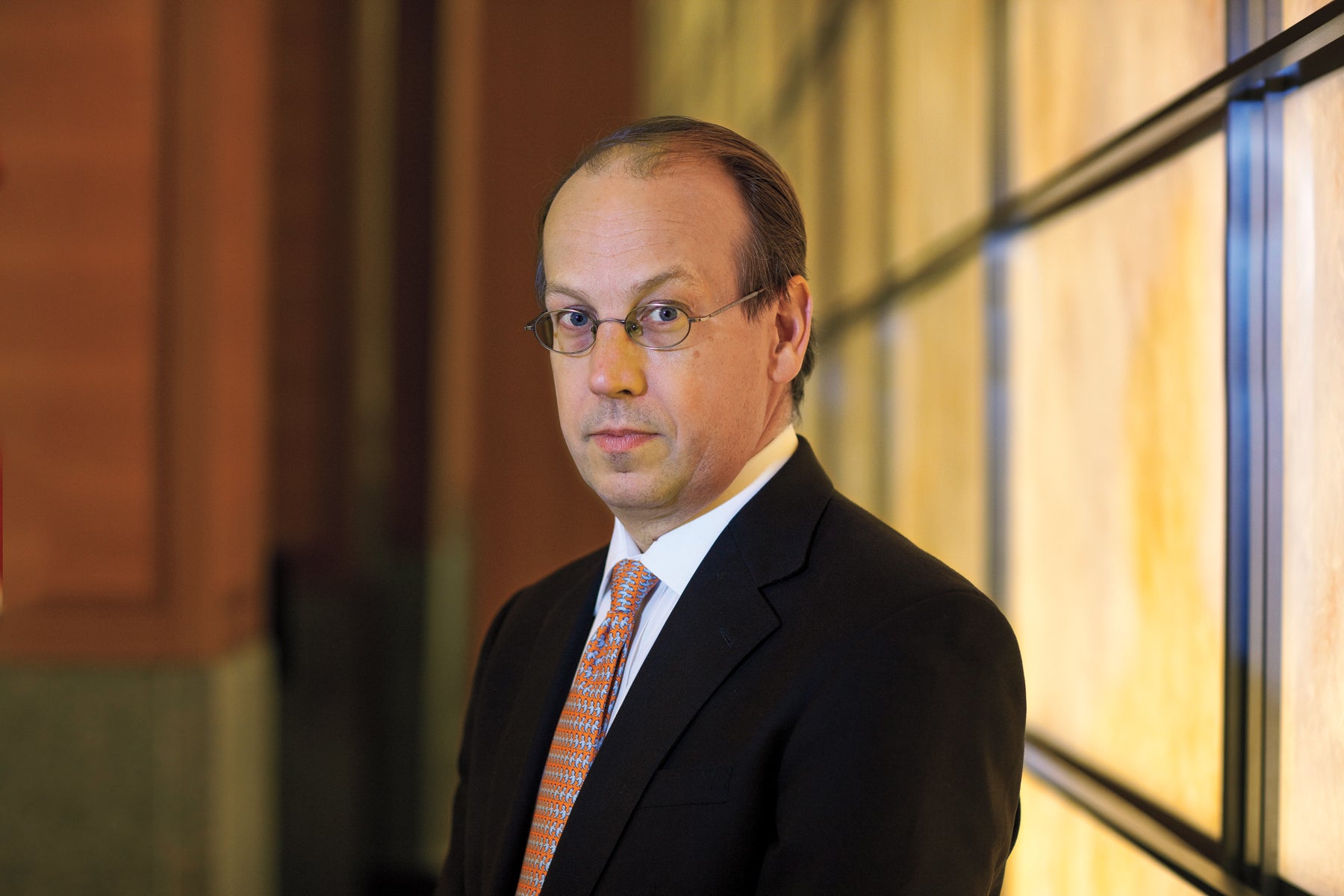There are two things Paul Clement ’92 won’t do: Tell you where he stands on same-sex marriage, and grouse about the controversy that enveloped him last spring when he resigned from his law firm in order to continue defending U.S. House of Representatives Republicans in litigation over the Defense of Marriage Act.
Clement, who had been hired to defend the law, left King & Spalding of Atlanta after the firm withdrew its representation. The firm’s chairman, Robert D. Hays Jr., said that the process used for vetting the engagement was inadequate. There was also backlash from attorneys and their supporters over a clause in the engagement contract with the House that would prohibit the firm’s employees from personally advocating for or against the 1996 DOMA, which defines marriage as between a man and a woman.
For days, the blogosphere, legal forums and editorial pages were afire over whether Clement was a hero or a human-rights basher. (Neither, he says. The explanation he gave former partners in his much-publicized resignation letter still stands, says Clement. “A representation should not be abandoned because the client’s legal position is extremely unpopular in certain quarters. Defending unpopular positions is what lawyers do,” he wrote.)
“Mr. Clement’s statement misses the point entirely,” Richard Socarides, president of Equality Matters, fired back in The New York Times, echoing criticism from other gay-rights groups. “While it is sometimes appropriate for lawyers to represent unpopular clients when an important principle is at issue, here the only principle he wishes to defend is discrimination and second-class citizenship for gay Americans.”
The buzz unleashed by his decision to leave King & Spalding, one of the nation’s oldest and largest firms, underscores the challenge facing Clement, who now represents the House Republicans as a partner at Bancroft PLLC.
It’s likely Clement’s ability to long-jump over criticism has at least something to do with his seemingly unshakable pragmatism.
“Nobody really wakes up in the morning and says, ‘I’d really like to be a teaching moment today at the expense of my career,’” he said of the DOMA dustup. “When the stakes are this high, sure, people are going to speculate and attribute motives—that’s just part of the process. The good news is that it’s just speculation. … I didn’t resign because I wanted to take a stand on policy issues.”
What heartened him during the controversy (which he said, affably, “wasn’t that unpleasant”) were the reminders by his defenders (including Attorney General Eric Holder, who announced early this year that the Obama administration would no longer defend the federal ban on same-sex marriage in court) that an attorney’s job is simply to represent the client who signed on with him.
“In … representing Congress in connection with DOMA, I think he is doing that which lawyers do when we’re at our best,” Holder told the media in April. “[The] criticism, I think, was very misplaced.”
“It’s not that different from representing Guantánamo detainees. This isn’t a left or right issue; it’s something lawyers should stand together on,” said Clement, who is also defending South Carolina’s controversial voter identification law and Arizona’s disputed immigration law. He also represented the NFL earlier this year in its dispute with players.
“As a football fan,” he said, “that was a fun case.”

The holy grail of law firm recruiting
One of the youngest attorneys to hold the position, Clement, 45, served as the 43rd solicitor general of the United States, from June 2005 until June 2008. Before that he was acting solicitor general for nearly a year and principal deputy solicitor general for three years, defending the legality of the Bush administration’s war on terror.
He has argued more than 50 cases before the United States Supreme Court, a list including McConnell v. FEC, Tennessee v. Lane, Rumsfeld v. Padilla, Credit Suisse v. Billing, United States v. Booker, MGM v. Grokster and McDonald v. Chicago. He also argued many of the government’s most important cases in the lower courts, such as Walker v. Cheney and the successful appeal in United States v. Moussaoui.
In 2008, while he was poised to move into private practice and was being wooed by top-tier firms, attorneys and legal-watchers referred to him as the “holy grail” of law firm recruiting.
He is known for his capabilities as a skilled orator with a photographic memory. He most often argues notes-free. At a celebration two years ago on the occasion of Clement’s 50th Supreme Court argument, Deputy Solicitor General Edwin Kneedler described his argument style as “assurance without cockiness,” according to The Blog of Legal Times.
Legal observers have predicted that Clement could be heading toward a promising, high-profile judgeship or even, one day, a spot on the high court.
It’s hard to believe that just six years ago, when he took over the SG office from Theodore Olson, Clement was a relative unknown with much to prove, said HLS Professor Richard Lazarus ’79.
“He established very quickly that he was first-rate,” Lazarus said. “He’s very smooth. He’s engaging. Formal but not too much so. Extremely credible and straight with the justices. You don’t have the sense that anyone is trying to sell you anything.”
Clement’s notes-free style is impressive, Lazarus said, especially in complex cases. One such case, Rapanos v. United States in 2006, involved a challenge to the federal jurisdiction to regulate wetlands under the Clean Water Act.
“It was classic Paul Clement,” Lazarus said of the argument before the Court. “This is a case which involves an extraordinarily complicated federal statutory scheme, chemistry, geography, resources. There’s a huge amount of law to learn, to make this argument.
“He did it beautifully. He stood his ground. He was very solicitous but direct with Justice Scalia. If the environmentalists had wanted the very best possible argument for their side, they got it from a Republican-appointed solicitor general.”

A fascination with the gray areas of law
Clement grew up in the Milwaukee suburb of Cedarburg, Wisc., where he went to public school. He received his bachelor’s degree summa cum laude from the Georgetown University School of Foreign Service, earned a master’s degree in economics from University of Cambridge, and graduated magna cum laude from Harvard Law School, where he was the Supreme Court editor of the Harvard Law Review.
“He was a standout,” said Eric Sacks ’92, now a partner at the firm Jenner & Block who was in the same class and section as Clement and, despite some differing political views, remains close to him.
“One of my first memories of Paul is in Phillip Areeda’s Contracts class. He held his own up there against Areeda’s amazing combination of intimidation and kindness,” said Sacks.
“Paul’s a master of making a position, whatever the position is, seem reasonable. He has respect from both sides.”
Clement said he was fascinated by appellate and constitutional law from the start: “You’re playing around in the gray areas of the law.”
His most challenging case so far, he says, was probably McConnell v. FEC, in which he successfully defended the McCain-Feingold campaign finance reform law.
The 2003 case, which involved more than a dozen parties, a warren of First Amendment issues and a towering stack of briefs filed with the Court, was “very difficult to manage,” said Clement. “Pretty messy. Not something that looked like anything the Supreme Court usually takes.”
Clement’s team consolidated, filing one 135-page brief. “The 30-minute Supreme Court argument is nothing compared to the work going into the brief, the work that is a lot less glamorous. But it really is the necessary part of what an appellate lawyer does.”
The DOMA case was not the first in Clement’s career to cause controversy. In 2004, while arguing before the U.S. Supreme Court on the Bush administration’s right to detain enemy combatants, Clement denied that the administration tortured detainees.
Hours later, CBS aired the first photographs of U.S. soldiers abusing Iraqi prisoners at Abu Ghraib. Clement would later say that he did not have the all the facts that day in court.
He’s willing to acknowledge his “teaching moments,” but the trademark easygoingness masks a toughness. He doesn’t blame people who feel close to an issue for pushing for change—as the Human Rights Campaign did when it urged major U.S. law firms, including King & Spalding, not to represent the House in DOMA—but he doesn’t want his time wasted.
“I’m here to listen to legal arguments, and if you don’t have one of those, we’re done.”
An appellate lawyer, not a policy referee
In many ways, Clement says, DOMA boils down to the type of case he spent the bulk of his career on: a federal statute whose constitutionality requires defending.
But he agrees that the case is different, too.
“Obviously it’s a case that inspires a lot of strong feelings on both sides, maybe to a unique degree, given what’s at stake.”
Asked to spell out what is at stake from his perspective, he immediately answered, “What kind of marriage is the government going to recognize? As a lawyer, you have to try to deal with the legal issue that’s at the heart of the case, [but] you never ignore the fact that the issue is inspiring strong feelings.”
Despite that, he said, “The job of lawyer is not to referee policy issues. Tell Congress to repeal the statute and then this whole issue will go away. But don’t tell one lawyer or another not to [do his job].”
The hardest case to argue
On the American political spectrum, Clement carries conservative currency. He clerked for Judge Laurence H. Silberman ’61 of the U.S. Court of Appeals for the D.C. Circuit and for Justice Antonin Scalia ’60 of the U.S. Supreme Court. After his clerkships, Clement served as chief counsel of the U.S. Senate Subcommittee on the Constitution, Federalism and Property Rights, which was chaired by John Ashcroft.
He is a politically comfortable choice for Republicans looking for legal representation, as in the DOMA case and the Florida challenge to President Obama’s health care law, which will take him again before the Supreme Court. But he has also represented clients across ideological lines, and cases like the campaign finance reform defense have helped win him a balanced reputation among Democrats.
Another success this year was Brown v. Plata, in which a 5-4 decision by the Supreme Court affirmed a lower three-judge panel’s order that California reduce the inmate population in its overcrowded prisons. Clement represented a class of prisoners in the case.
“Look, I’m a Republican,” said Clement. “But it certainly doesn’t define the kinds of cases I take on. You read about one big case and you think, That must be the kind of lawyer he is. That’s not what it’s about. The specialty an appellate lawyer provides is pitching legal cases to appellate judges.
“You’re not a criminal defense lawyer; you’re not a sports lawyer; you’re not a labor lawyer; you’re not an antitrust lawyer; you’re not a DOMA lawyer. You’re an appellate lawyer, and you may turn from one of those issues to another, one after another,” he said.
If anything lingers from the King & Spalding affair, it might be the larger discussion around general service law firms and attorneys’ responsibilities and opportunities within the context of the nation’s growing ideological divide.
In an analysis in The American Lawyer in July, HLS Professor David B. Wilkins ’80 and Ben W. Heineman Jr., senior fellow at the school’s Program on the Legal Profession, determined that if the DOMA representation had come to them as members of King & Spalding’s initial review committee, they would likely have declined it for two reasons: the much-discussed provision in the engagement contract that many believed would have, had the firm taken the case, prevented employees from acting on personal political beliefs, and, secondly, because “the principle of nondiscrimination on the basis of race, religion, gender, national origin, or sexual orientation is and ought to be a core commitment of our society and of our law firm.”
Beyond that, Wilkins and Heineman wrote, general service firms will increasingly need to carefully consider how they decide whether partners can represent controversial clients. “Will the polarization of our politics lead to the polarization of general service law firms?” they mused.
Clement, for one, hopes not.
“It’s the diversity of practice that defines it,” he said. “Some of my best arguments have been in cases where, if I had to say my personal views, I would say I’m skeptical.
“The hardest case to argue is one where you’re so sure you’re right, you don’t see where somebody who disagrees with you is going to come from.”
